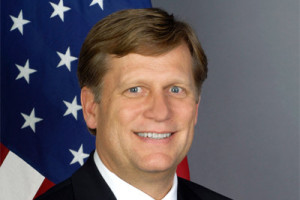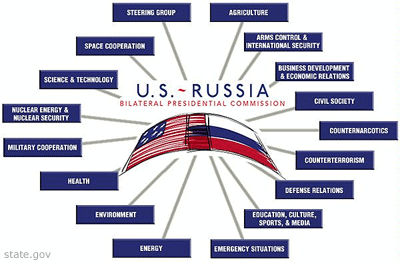McFaul: Happy New Year: Looking Back, Looking Forward [excerpt]

(U.S. Ambassador Michael McFaul – http://m-mcfaul.livejournal.com/ – January 15, 2014)
[excerpt; complete text here http://m-mcfaul.livejournal.com/17235.html]
January is always a good month to assess the accomplishments of the previous year and look forward to progress in the new year. This month marks not only the end of my second year as the U.S. Ambassador to the Russian Federation but also the end of my fifth year in the Obama administration, giving me a perspective about U.S. policy toward Russia that goes back to January 2009.
In that context, there is no question that 2013 was a challenging year for U.S.-Russian relations, when compared to earlier years of the Obama administration, even though it ended on a more positive note. While many important areas of cooperation, especially regarding security and economic matters, continued uninterrupted, the fact that we decided to postpone the summit between our two presidents underscores the difficulties we encountered in trying to advance our common interests last year. At the same time, America and Russia’s close cooperation on Iran and Syria in the fall of 2013 helped produce breakthroughs in our common quest to deter the use and prevent the proliferation of weapons of mass destruction. We aim to build on the positive momentum of the end of last year to achieve new progress on both Iran and Syria, as well as a range of other issues in 2014.
The mixed record of achievement in 2013 compels us to search for new, creative ways to approach U.S.- Russia relations in all dimensions in the new year. That includes cooperation on security matters around the globe, renewed efforts to increase trade and investment between our two countries, and maintaining our commitment to advance universal values. Our general approach, however, will not change. Since 2009, our strategy toward Russia has achieved important outcomes that serve our security and economic interests. I discussed these achievements in details in this talk. In 2014, we will continue to engage the Russian government on a wide range of issues in pursuit of outcomes that are good for Americans and good for Russians.
We also will continue to engage with the Russian government on issues over which we disagree because we want to make sure that our disagreements are based on an accurate understanding of each country’s interests. Diplomacy’s greatest sin is to allow conflicts to emerge that are based on bad information or misperceptions. We will continue to work closely with the Russian government to make sure that disagreements in one area do not damage cooperation in another. And in parallel, as we have done for the last five years, we will continue to engage with Russian society including business and non-governmental organizations and look for new ways to enhance contacts between our societies. Our reasoning for pursuing this dual-track engagement with both the government and civil society is simple: the more connections there are between our two societies, the lesser the chance that our governments will take actions that are not in the interests of our societies.
The 2013 Scorecard
The first half of 2013 produced few positive achievements in our bilateral relationship with Russia. Strategic stability talks continued but disagreements about missile defense cooperation and further cuts in our nuclear arsenals remained. Regarding economic cooperation, our farmers and ranchers endured a terrible blow in February 2013 when the Russian government restricted exports of American beef, pork, and turkey as a result of its decision to enforce a zero-tolerance standard for residues of the feed additive ractopamine despite U.S. government approval of this additive, establishment of a Codex standard, and scientific evidence indicating that ractopamine can be used safely. The Russian government’s decision meant a loss of roughly $600 million in U.S. exports to Russia last year, based on 2012 trade numbers.
Another negative development was the termination last January of our agreement for law enforcement assistance. Our government also was dismayed by new efforts to constrain Russian civil society and a spike in anti-American propaganda on state-controlled media outlets in Russia. Over the summer of last year, the Russian government’s handling of Edward Snowden added a new irritant to our bilateral relations. The sum of these negative developments compelled President Obama to postpone his trip to Moscow, planned for the first week in September of last year. And in December, the United States while encouraging Ukraine to develop normal relations with its neighbors made clear our belief that European integration provides the surest path toward Ukraine’s democratic future and economic prosperity. We believe that Ukraine’s future is not a zero-sum calculation.
In parallel to these negative developments, however, was continued cooperation on a number of important security and economic issues. The implementation of the New Start Treaty continued quietly without major complications. U.S.-Russian cooperation on Afghanistan continued without major fanfare. And while we will lose a critical asset to our supply network for our soldiers in Afghanistan (the Manas Transit Center in Kyrgyzstan) this year, we expect to maintain access to critical components of the Northern Distribution Network provided by Russia. That will become especially valuable to the United States as we remove military equipment from Afghanistan in 2014.
In order to stem the nuclear proliferation threat from North Korea and Iran, the United States and Russia have worked closely over the last five years to approve and enforce United Nations Security Council resolutions that sanction these countries. This cooperation continued throughout 2013, and with respect to Iran produced an historic result: the signing of the November 2013 Joint Plan of Action between Iran and the P5+1 countries. While just a first step, the agreement achieved a great deal. For the first time in nearly a decade, Iran agreed to halt the progress of its nuclear program and roll back certain of its crucial aspects. Negotiations to reach a comprehensive agreement over the next six months won’t be easy, and significant challenges lie ahead. On this issue, which is a centerpiece of U.S. foreign policy, U.S.-Russian cooperation has proven real and pivotal. Continued cooperation between the United States and Russia also will be necessary to achieve results in North Korea.
Even in certain areas on which we disagreed, the United States and Russia found a way to cooperate on our shared objectives. An excellent example is Syria. While the United States and Russia continue to have very different ideas on how to reach a political solution to the crisis, our leaders found a way to cooperate to secure and destroy Syria’s chemical weapons. Since our historic September 14th agreement, we have made significant progress toward our goal of the complete removal and destruction of Syria’s chemical weapons by mid-2014. This is remarkable considering that just five months ago, Syria would not even admit to having chemical weapons. Much of the success of this endeavor is thanks to the close, continuing cooperation between the United States and Russia….

